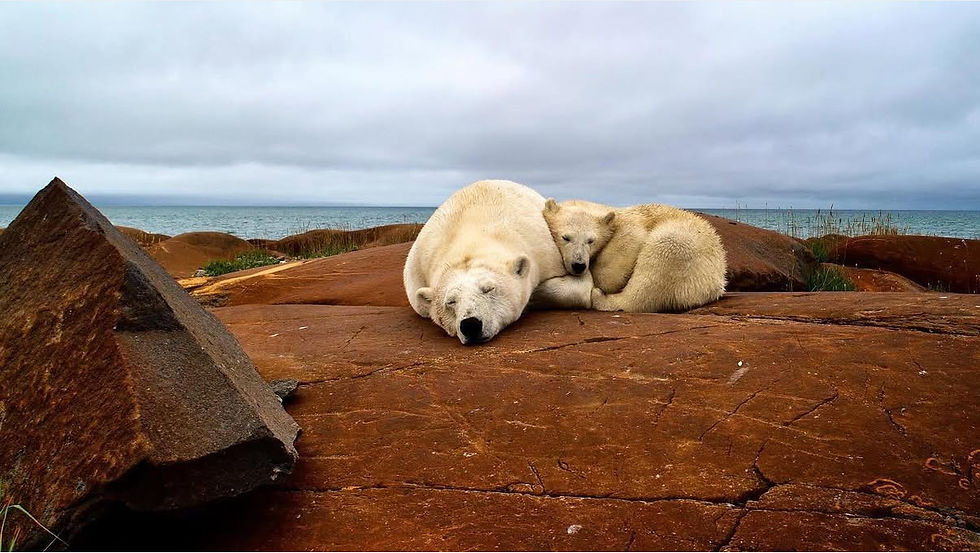Our Latest Short Feature for National Geographic Just Dropped: Western Hudson Bay Marine Conservation
- Always Build

- Aug 7, 2025
- 4 min read
We’re proud to announce the release of our latest short documentary feature, created in collaboration with National Geographic Pristine Seas. This project takes you deep into the heart of one of Canada’s most iconic and ecologically significant regions — Western Hudson Bay — and shares the urgent need for marine protection in the face of rapid environmental change.
Watch the full short film here:
Western Hudson Bay Marine Conservation
Most people know Churchill, Manitoba as the “Polar Bear Capital of the World,” but few realize its critical role in global marine conservation. Situated on the southern edge of the Arctic, Western Hudson Bay is home to a rich marine ecosystem that includes beluga whales, seals, Arctic foxes, migratory birds, and of course, polar bears. But beyond the wildlife, this region tells a larger story about climate change, community resilience, and the future of Canada’s oceans.
Right now, only 8% of Canada’s marine and coastal areas are officially protected. That leaves ecosystems like Hudson Bay vulnerable — and stories like Churchill’s underrepresented.
Our film sheds light on:
Why Western Hudson Bay is a globally significant marine ecosystem
How climate change and human activity are impacting Arctic biodiversity
Why local Indigenous and community leadership must be central to conservation efforts
What it will take for Canada to prioritize Churchill in its marine protection strategy

"Right now, only 8% of Canada’s marine and coastal areas are officially protected."
A Ground-Level View of Conservation in Churchill
Filmed on location in Churchill, this project was built from the ground up. Rather than imposing a narrative, we began — as we always do — by listening. This region is layered. It’s a place where science, policy, tradition, and lived experience intersect in complex ways.
“We approached this piece the way we approach most conservation stories: start by listening,” says Christopher Paetkau, co-founder of Always Build Studios.
“Churchill has layers — science, policy, lived experience — and they don’t all speak the same language. Our goal was to build something honest and accessible that could connect those threads without oversimplifying them.”
The film captures not only the stunning beauty of the Arctic ecosystem, but also the lived realities of those who call Churchill home — and who are working to protect it.

Churchill Is More Than a Destination — It’s a Frontline
When most people think of Arctic Canada, they imagine remote ice fields or isolated wilderness. But Churchill is different. It’s a town with deep community roots, a thriving tourism economy, and a growing voice in global conservation conversations.
And yet, Churchill is also on the frontline of climate change. Sea ice is breaking up earlier. Beluga whale migration patterns are shifting. Polar bears are coming ashore sooner.
These changes affect not only wildlife, but the people who live and work in the region.
If Canada is serious about meeting its climate and conservation goals, Churchill must be part of the solution.

Collaborators Who Brought the Story to Life
We had the honour of working with some of the most trusted and knowledgeable voices in the Churchill region. This film wouldn’t exist without their insight, generosity, and time.
A highly respected marine biologist and Arctic researcher, Kristin helped us understand the complex web of life in Hudson Bay. Her deep knowledge shaped the way we approached both the visuals and the story.
Mayor of Churchill and lifelong advocate for Northern communities, Mike gave us a direct view into what’s at stake. His leadership continues to inspire real dialogue about Indigenous stewardship and policy change.
Brendan McEwan
A local storyteller and guide with Custom Churchill Tours, Brendan is the heart of this piece. His ability to weave lived experience with historical context brought an emotional depth we’re deeply grateful for.
If you ever find yourself in Churchill, we highly recommend connecting with Brendan and his team. Their tours are rooted in respect for the land and the people who live there.

Why This Story, and Why Now
As the world races to meet targets for climate resilience and biodiversity conservation, storytelling has never been more important. Data alone won’t move people — but stories can.
This film is part of a broader effort to help build awareness, influence policy, and support the creation of Marine Protected Areas (MPAs) in Hudson Bay. With organizations like National Geographic Pristine Seas leading global ocean protection initiatives, and local leaders advocating from the ground up, the opportunity to create meaningful change is real.
By highlighting Churchill’s story, we hope to bring broader visibility to a place that too often gets left out of the national conversation — despite its critical ecological role.
What You Can Do to Support Arctic Conservation
If you’ve ever felt inspired by the North — its landscapes, its wildlife, its people — now is the time to act. Here are a few ways to get involved:
Watch and Share the Film
The more people who see and understand Churchill’s story, the more momentum we can build for protection. Watch here
Support Marine Conservation Organizations
Learn more about the incredible work of National Geographic Pristine Seas and how they’re helping protect the world’s last wild places: https://www.nationalgeographic.org/society/our-programs/pristine-seas
Follow and Amplify Local Voices Support Northern scientists, leaders, and storytellers who are advocating for the Arctic every day. Follow organizations based in Churchill and support businesses that prioritize conservation.
Stay Informed Understanding the complexities of Arctic conservation takes time. Read, ask questions, and stay engaged. Policy change starts with public awareness.
Churchill’s Future Is Canada’s Responsibility
Churchill isn’t just a travel destination. It’s not just a backdrop for polar bears. It’s a community, a hub of research, and a powerful example of how local action can influence global conservation goals.
We’re incredibly grateful to National Geographic Pristine Seas for the opportunity to tell this story, and even more grateful to the people of Churchill for welcoming us into their world.
We hope this film helps bring greater visibility to the importance of Western Hudson Bay and the community of Churchill. If it moves you, share it. Start a conversation. Support local efforts. Because the more we understand what’s at stake, the better chance we have at protecting it.



Comments